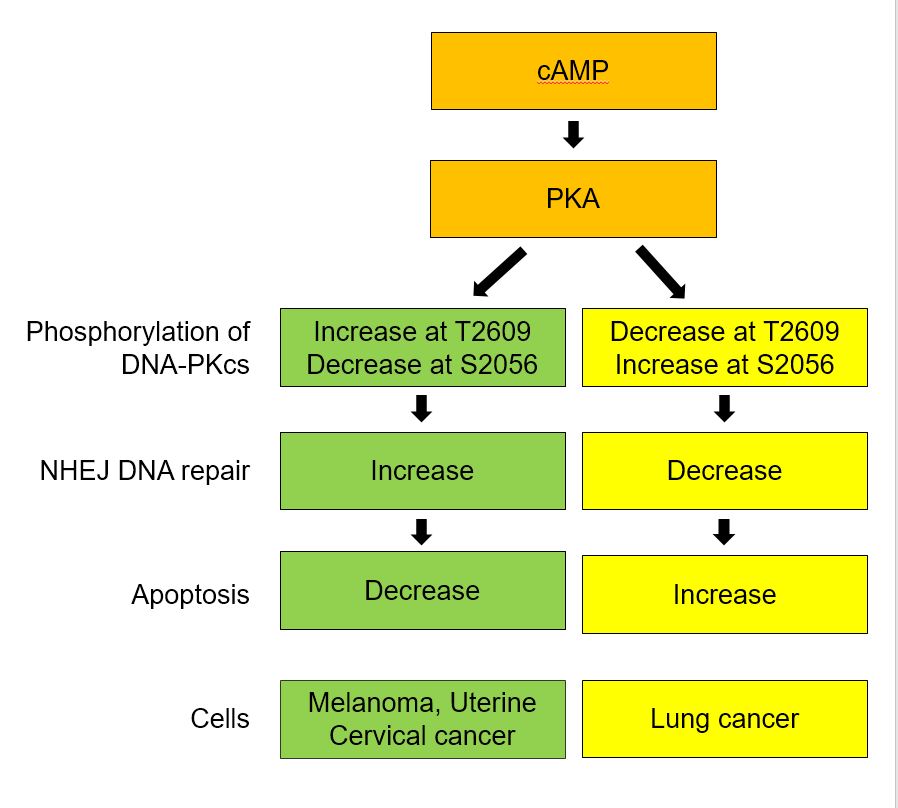글로벌 연구동향
방사선생물학
- 2021년 02월호
[J Korean Med Sci.] Cell-type-specific Modulation of Non-homologous End Joining of Gamma Ray-induced DNA Double-strand Breaks by cAMP Signaling in Human Cancer Cells서울의대 / 노성은, 전용성*
- 출처
- J Korean Med Sci.
- 등재일
- 2020 Dec 14
- 저널이슈번호
- 35(48):e371. doi: 10.3346/jkms.2020.35.e371.
- 내용
Abstract
Background: Cyclic AMP (cAMP) signaling is activated by various hormones and neurotransmitters and regulates numerous physiological phenomena, including energy metabolism, gene expression, and proliferation. cAMP signaling plays a role in the repair of DNA damage, but its specific function is inconsistent in the literature. The present study aimed to investigate the mechanism of the different roles of cAMP signaling in DNA repair by analyzing the cell-type differences in the modulation of DNA repair by cAMP signaling following γ-ray irradiation.Methods: cAMP signaling was activated in human malignant melanoma cells (SK-MEL-2 and SK-MEL-28), human uterine cervical cancer cells (HeLa and SiHa) and human non-small cell lung cancer cells (H1299 and A549) by expressing a constitutively active mutant of the long-form stimulatory α subunit of GTP-binding protein or by treating with isoproterenol and prostaglandin E2 before γ-ray irradiation. DNA damage was quantitated by western blot analysis of γ-H2AX, and non-homologous end joining (NHEJ) was assessed by fluorescent reporter plasmid repair assay and immunofluorescence of microscopic foci of XRCC4 and DNA-ligase IV.
Results: cAMP signaling modulated DNA damage, apoptosis and the NHEJ repair following γ-ray irradiation differently depending upon the cell type. cAMP signaling regulated the phosphorylation of DNA-dependent protein kinase catalytic subunit (DNA-PKcs) at Ser2056 and Thr2609 in cell-type-specific manners following γ-ray irradiation, an activity that was mediated by protein kinase A.
Conclusion: cAMP signaling modulates the NHEJ repair of γ-ray-induced DNA damage in melanoma cells, uterine cervical cancer cells and lung cancer cells in a cell-type-specific manner, and the modulation is likely mediated by protein kinase A-dependent phosphorylation of DNA-PKcs. This study suggests that cell- and tissue-specific modulation of DNA damage repair by cAMP signaling may contribute to improve the therapeutic efficiency of radiation therapy.

Affiliations
Sung Eun Noh 1 , Yong Sung Juhnn 2
1 Department of Biochemistry and Molecular Biology, Department of Biomedical Sciences, and Cancer Research Institute, Seoul National University College of Medicine, Seoul, Korea.
2 Department of Biochemistry and Molecular Biology, Department of Biomedical Sciences, and Cancer Research Institute, Seoul National University College of Medicine, Seoul, Korea. juhnn@snu.ac.kr.
- 키워드
- Cell-type Specificity; DNA Repair; DNA-dependent Protein Kinase, Gamma Radiation; Non-homologous End Joining; cAMP.
- 연구소개
- cAMP 신호전달계가 방사선조사에 의해 유발된 DNA double strand breaks의 Non-homologous End Joining (NHEJ)을 조절한다는 논문(Sci Rep. 2020 Sep 2;10(1):14455)의 후속 논문이다. 이 논문은 cAMP 신호전달계가 세포주의 종류에 따라서 NHEJ 복구를 서로 다르게 조절한다는 사실을 보여 주었으며, 더 많은 세포주 또는 세포나 조직에서 연구하면 이를 일반화할 수 있을 것이다. 이 논문 결과는 세포의 cAMP 신호전달계 활성에 따라서 방사선 조사에 따른 DNA 손상의 복구가 달라진다는 것을 시사하며, 이는 방사선 치료 효율을 높이거나 부작용을 감소시키려는 연구에 활용할 수 있을 것이다.
- 덧글달기







